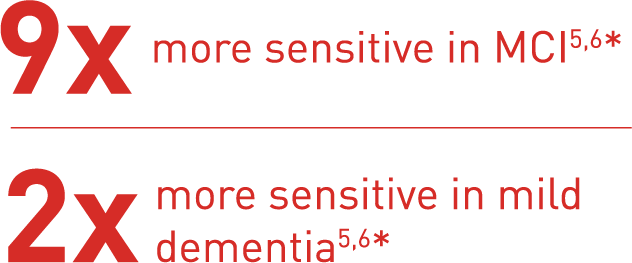
Clinical Assessment
To intervene early in Alzheimer’s disease (AD), the cause of cognitive impairment should be identified as soon as symptoms occur1,2
With new therapies focusing earlier in the disease continuum, assessing cognitive impairment as early as possible is more important than ever.3
Implementing sensitive screening measures more frequently can help to proactively assess the presence of MCI or dementia symptoms, which may identify patients who require further diagnostic workup for AD.2
After performing clinical assessments such as Mini-Cog©, GPCOG, MoCA, or SLUMS, biomarker tools can help support the timely and accurate diagnosis of AD.2,4

Brief objective tools, like the Mini‐Cog©, have proven to be 9x more sensitive in MCI and 2x more sensitive in mild AD dementia.5,6
*Compared to subjective physician assessment; in a study evaluating the Mini-Cog© vs physician assessment alone. Other examples of objective assessment tools that take 10 or less minutes to administer include the MIS and the GPCOG.5,6
AAN=American Academy of Neurology; GPCOG=General Practitioner Assessment of Cognition; MCI=mild cognitive impairment; MIS=Memory Impairment Screen; MoCA=Montreal Cognitive Assessment; SLUMS=Saint Louis University Mental Status.
Even before referral to a specialist, primary care providers and geriatricians can initiate an evaluation of cognitive impairment or dementia with the help of cognitive assessments, such as the Mini-Cog©, GPCOG, MoCA, or SLUMS5
The following tests are representative only; alternative tools are available and can be used at the discretion of the clinician.
Mini-Cog©5,7,8
Summary
Composite of 3-word recall and clock drawing; validated in multiple languages in primary care setting; has been found to be more sensitive than MMSE for detecting mild cognitive impairment
Duration
2-4 min*
GPCOG5,7
Summary
Patient section assesses aspects of orientation, awareness, and memory. Informant section compares patient’s current and previous functioning
Duration
2 to 5 min (patient);
1 to 3 min (informant)*
MoCA2,9
Summary
1-page, 30-point test; assesses 8 cognitive domains through 13 tasks; available in 30 languages; has been found to be more sensitive than MMSE in assessing memory, visuospatial, executive, language function, and orientation to time and place
Duration
10 min
SLUMS10
Summary
30-point, 11-item scale comprising various cognitive assessments; tasks assess attention, numeric calculation, immediate and delayed recall, animal naming, digit span, clock drawing, figure recognition/size differentiation, and immediate recall of facts from a paragraph
Duration
7 min
If cognitive impairment is detected, it is important to either evaluate the cause via a full diagnostic workup or refer your patient to a specialist2
Following referral to a dementia specialist by a primary care provider, patients may undergo biomarker testing and further cognitive, functional, and behavioral tests to confirm a diagnosis of AD.2

Did you know?
The Medicare Annual Wellness Visit requires a patient evaluation to assess cognitive impairment, and the AAN guidelines recommend using a brief, validated cognitive assessment tool and obtaining a cognitive history from the patient and informant to identify any concerns.11
Learn more about Medicare coverage of cognitive assessment services
“With the diagnosis, now I know what’s happening to me.”
Add biomarker evidence to your diagnostic workup
DISCOVER AVAILABLE TOOLS
“With the diagnosis, now I know what’s happening to me.”
Add biomarker evidence to your diagnostic workup
DISCOVER AVAILABLE TOOLS
MMSE=Mini-Mental State Examination.
*Different times reported. Times may vary.5,8,12
†Sensitivity: ability of the test to correctly identify those patients with disease.
‡Specificity: ability of the test to correctly identify those patients without disease.
§A cutoff point of <3 on the Mini-Cog© has been validated for classifying subjects as “probably impaired,” but many individuals with clinically meaningful cognitive impairment will score higher. When greater sensitivity is desired, a cutoff point of ≤3 is recommended, as it may indicate a need for further evaluation of cognitive status.
References:
- Balasa M, Gelpi E, Antonell A, et al. Clinical features and APOE genotype of pathologically proven early-onset Alzheimer disease. Neurology. 2011;76(20):1720-1725.
- Porsteinsson AP, Isaacson RS, Knox S, et al. Diagnosis of early Alzheimer’s disease: clinical practice in 2021. J Prev Alzheimers Dis. 2021;8:371-386.
- Aisen PS, Cummings J, Jack CR Jr, et al. On the path to 2025: understanding the Alzheimer's disease continuum. Alzheimers Res Ther. 2017;9(1):60. doi:10.1186/s13195-017-0283-5
- Andersen E, Casteigne B, Chapman WD, et al. Diagnostic biomarkers in Alzheimer’s disease. Biomark Neuropsychiatry. July 15, 2021. Accessed June 27, 2022. doi:10.1016/j.bionps.2021.100041
- Cordell CB, Borson S, Boustani M, et al. Alzheimer’s Association recommendations for operationalizing the detection of cognitive impairment during the Medicare Annual Wellness Visit in a primary care setting. Alzheimers Dement. 2013;9(2):141-150.
- Borson S, Scanlan JM, Watanabe J, et al. Improving identification of cognitive impairment in primary care. Int J Geriatr Psychiatry. 2006;21(4):349-355.
- Kansagara D, Freeman M. A systematic evidence review of the signs and symptoms of dementia and brief cognitive tests available in VA. Evidence-Based Synthesis Program. 2010. VA-ESP Project #05-225.
- Li X, Dai J, Zhao S, et al. Comparison of the value of Mini-Cog and MMSE screening in the rapid identification of Chinese outpatients with mild cognitive impairment. Medicine (Baltimore). 2018;97(22):e10966.
- Nasreddine ZS, Phillips NA, Bédirian V, et al. The Montreal Cognitive Assessment, MoCA: a brief screening tool for mild cognitive impairment. J Am Geriatr Soc. 2005;53(4):695-699.
- Tariq SH, Tumosa N, Chibnall JT, et al. Comparison of the Saint Louis University mental status examination and the mini-mental state examination for detecting dementia and mild neurocognitive disorder—a pilot study. Am J Geriatr Psychiatry. 2006;14(11):900-910.
- Petersen RC, Lopez O, Armstrong MJ, et al. Practice guideline update summary: mild cognitive impairment: report of the Guideline Development, Dissemination, and Implementation Subcommittee of the American Academy of Neurology. Neurology. 2018;90(3):126-135.
- Hort J, O'Brien JT, Gainotti G, et al. EFNS guidelines for the diagnosis and management of Alzheimer’s disease. Eur J Neurol. 2010;17(10):1236-1248.